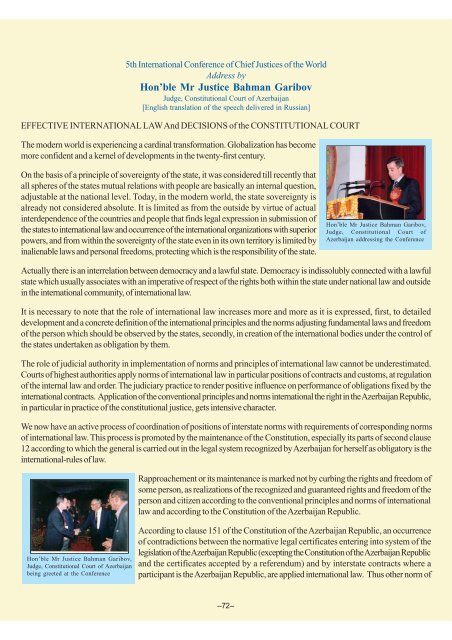Download the Speeches of all Hon'ble Chief Justices & Judges in ...
Download the Speeches of all Hon'ble Chief Justices & Judges in ...
Download the Speeches of all Hon'ble Chief Justices & Judges in ...
Create successful ePaper yourself
Turn your PDF publications into a flip-book with our unique Google optimized e-Paper software.
5th International Conference <strong>of</strong> <strong>Chief</strong> <strong>Justices</strong> <strong>of</strong> <strong>the</strong> WorldAddress byHon’ble Mr Justice Bahman GaribovJudge, Constitutional Court <strong>of</strong> Azerbaijan[English translation <strong>of</strong> <strong>the</strong> speech delivered <strong>in</strong> Russian]EFFECTIVE INTERNATIONAL LAW And DECISIONS <strong>of</strong> <strong>the</strong> CONSTITUTIONAL COURTThe modern world is experienc<strong>in</strong>g a card<strong>in</strong>al transformation. Globalization has becomemore confident and a kernel <strong>of</strong> developments <strong>in</strong> <strong>the</strong> twenty-first century.On <strong>the</strong> basis <strong>of</strong> a pr<strong>in</strong>ciple <strong>of</strong> sovereignty <strong>of</strong> <strong>the</strong> state, it was considered till recently that<strong>all</strong> spheres <strong>of</strong> <strong>the</strong> states mutual relations with people are basic<strong>all</strong>y an <strong>in</strong>ternal question,adjustable at <strong>the</strong> national level. Today, <strong>in</strong> <strong>the</strong> modern world, <strong>the</strong> state sovereignty isalready not considered absolute. It is limited as from <strong>the</strong> outside by virtue <strong>of</strong> actual<strong>in</strong>terdependence <strong>of</strong> <strong>the</strong> countries and people that f<strong>in</strong>ds legal expression <strong>in</strong> submission <strong>of</strong><strong>the</strong> states to <strong>in</strong>ternational law and occurrence <strong>of</strong> <strong>the</strong> <strong>in</strong>ternational organizations with superiorpowers, and from with<strong>in</strong> <strong>the</strong> sovereignty <strong>of</strong> <strong>the</strong> state even <strong>in</strong> its own territory is limited by<strong>in</strong>alienable laws and personal freedoms, protect<strong>in</strong>g which is <strong>the</strong> responsibility <strong>of</strong> <strong>the</strong> state.Hon’ble Mr Justice Bahman Garibov,Judge, Constitutional Court <strong>of</strong>Azerbaijan address<strong>in</strong>g <strong>the</strong> ConferenceActu<strong>all</strong>y <strong>the</strong>re is an <strong>in</strong>terrelation between democracy and a lawful state. Democracy is <strong>in</strong>dissolubly connected with a lawfulstate which usu<strong>all</strong>y associates with an imperative <strong>of</strong> respect <strong>of</strong> <strong>the</strong> rights both with<strong>in</strong> <strong>the</strong> state under national law and outside<strong>in</strong> <strong>the</strong> <strong>in</strong>ternational community, <strong>of</strong> <strong>in</strong>ternational law.It is necessary to note that <strong>the</strong> role <strong>of</strong> <strong>in</strong>ternational law <strong>in</strong>creases more and more as it is expressed, first, to detaileddevelopment and a concrete def<strong>in</strong>ition <strong>of</strong> <strong>the</strong> <strong>in</strong>ternational pr<strong>in</strong>ciples and <strong>the</strong> norms adjust<strong>in</strong>g fundamental laws and freedom<strong>of</strong> <strong>the</strong> person which should be observed by <strong>the</strong> states, secondly, <strong>in</strong> creation <strong>of</strong> <strong>the</strong> <strong>in</strong>ternational bodies under <strong>the</strong> control <strong>of</strong><strong>the</strong> states undertaken as obligation by <strong>the</strong>m.The role <strong>of</strong> judicial authority <strong>in</strong> implementation <strong>of</strong> norms and pr<strong>in</strong>ciples <strong>of</strong> <strong>in</strong>ternational law cannot be underestimated.Courts <strong>of</strong> highest authorities apply norms <strong>of</strong> <strong>in</strong>ternational law <strong>in</strong> particular positions <strong>of</strong> contracts and customs, at regulation<strong>of</strong> <strong>the</strong> <strong>in</strong>ternal law and order. The judiciary practice to render positive <strong>in</strong>fluence on performance <strong>of</strong> obligations fixed by <strong>the</strong><strong>in</strong>ternational contracts. Application <strong>of</strong> <strong>the</strong> conventional pr<strong>in</strong>ciples and norms <strong>in</strong>ternational <strong>the</strong> right <strong>in</strong> <strong>the</strong> Azerbaijan Republic,<strong>in</strong> particular <strong>in</strong> practice <strong>of</strong> <strong>the</strong> constitutional justice, gets <strong>in</strong>tensive character.We now have an active process <strong>of</strong> coord<strong>in</strong>ation <strong>of</strong> positions <strong>of</strong> <strong>in</strong>terstate norms with requirements <strong>of</strong> correspond<strong>in</strong>g norms<strong>of</strong> <strong>in</strong>ternational law. This process is promoted by <strong>the</strong> ma<strong>in</strong>tenance <strong>of</strong> <strong>the</strong> Constitution, especi<strong>all</strong>y its parts <strong>of</strong> second clause12 accord<strong>in</strong>g to which <strong>the</strong> general is carried out <strong>in</strong> <strong>the</strong> legal system recognized by Azerbaijan for herself as obligatory is <strong>the</strong><strong>in</strong>ternational-rules <strong>of</strong> law.Rapproachement or its ma<strong>in</strong>tenance is marked not by curb<strong>in</strong>g <strong>the</strong> rights and freedom <strong>of</strong>some person, as realizations <strong>of</strong> <strong>the</strong> recognized and guaranteed rights and freedom <strong>of</strong> <strong>the</strong>person and citizen accord<strong>in</strong>g to <strong>the</strong> conventional pr<strong>in</strong>ciples and norms <strong>of</strong> <strong>in</strong>ternation<strong>all</strong>aw and accord<strong>in</strong>g to <strong>the</strong> Constitution <strong>of</strong> <strong>the</strong> Azerbaijan Republic.Hon’ble Mr Justice Bahman Garibov,Judge, Constitutional Court <strong>of</strong> Azerbaijanbe<strong>in</strong>g greeted at <strong>the</strong> ConferenceAccord<strong>in</strong>g to clause 151 <strong>of</strong> <strong>the</strong> Constitution <strong>of</strong> <strong>the</strong> Azerbaijan Republic, an occurrence<strong>of</strong> contradictions between <strong>the</strong> normative legal certificates enter<strong>in</strong>g <strong>in</strong>to system <strong>of</strong> <strong>the</strong>legislation <strong>of</strong> <strong>the</strong> Azerbaijan Republic (except<strong>in</strong>g <strong>the</strong> Constitution <strong>of</strong> <strong>the</strong> Azerbaijan Republicand <strong>the</strong> certificates accepted by a referendum) and by <strong>in</strong>terstate contracts where aparticipant is <strong>the</strong> Azerbaijan Republic, are applied <strong>in</strong>ternational law. Thus o<strong>the</strong>r norm <strong>of</strong>--72--
















